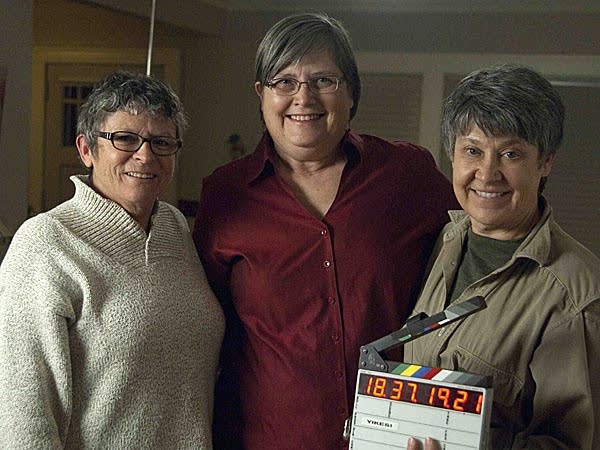Minnesota film aims to help deaf women facing breast cancer

Learning you have breast cancer is never easy, but for members of the deaf community the diagnosis can be particularly isolating. Now a group of Minnesota film makers are trying to change that with a documentary called "Signing On."
The film will be previewed this weekend in St. Paul, but it's already attracting attention internationally in the deaf community.
It's been almost 30 years since Anita Buel learned she had breast cancer, but speaking through a translator, she said she still remembers the awful feeling.
"I had no comprehension about what was going on with me," she said. "With the fact that I was raised with the notion of if you were diagnosed with cancer, you would die."
Create a More Connected Minnesota
MPR News is your trusted resource for the news you need. With your support, MPR News brings accessible, courageous journalism and authentic conversation to everyone - free of paywalls and barriers. Your gift makes a difference.
"It's that old thing of they never see themselves, and in this it's telling their real life stories."
Much of the problem was linguistic. While many hearing people assume American Sign language or ASL and English are essentially the same thing, Buel said they really aren't. Not only is the structure different, but there are English words that don't exist in ASL.
Also, many deaf people simply don't have access to information which hearing people can easily get just by asking. And on top of that, Buel said, there is the challenge of just talking about cancer.
"I think its a vocabulary problem for everyone, even with just a hearing audience," she said.
With the help of her family Buel made it through the treatment, but realized many other deaf breast cancer patients must have felt the same sense of profound isolation. So she founded a support group, with the refreshingly blunt name of the Pink Deafies. It was the first such group in the United States.
Buel and the Pink Deafies are the focus of "Signing On." Nancy Meyers, one of the film's co-producers, said the deaf community in the United States is now extremely well connected with email and other new technology. As a result, Buel is well known as someone to go to for advice. Meyers said they made the film in part to give Buel a break.
"Because it's not only the Minnesota deaf women she was hearing from, she had been contacted by deaf women across 22 states asking for information," Meyers said.
Signing on was made with multiple audiences in mind. Primarily it's aimed at deaf women, but it's also meant for families, and medical staff.
Director Barbara Allen said they wanted to show the complexities and pitfalls of even just passing on a diagnosis. In the film, one patient gets the news through a video relay call. It quickly gets complicated.
"She is on the video relay with an interpreter and the interpreter is becoming quite emotional trying to deliver the information," Allen said.
And Allen says even at the best of times the translation and response to a single question can take minutes, with the doctor just waiting on the phone. And even that's before those tricky vocabulary questions such as "what's a mammogram?" or even "what's a hospice?"
"There may be no equivalent sign in ASL," Allen said. "There would be in that case a lot of finger spelling, and a lot of 'what do you mean?' and 'give me an example' and back and forth. And that is not something that the healthcare professional I would suspect is prepared for."
Making a film for these different audiences was difficult. The documentary has to work for people speaking different languages, with different hearing abilities, and with wildly varying levels of medical expertise. Not only did Allen have to edit the film so it made sense to the signing part of the audience, she had to provide subtitles that worked both for ASL and English speakers.
"So this has been a big challenge for me to sort of map this out," Allen said.
The crew is actually racing to get the film finished for three screenings at St Catherine University tomorrow. One screening is already sold out.
Producer Nancy Meyers said while she knew word about the film would spread quickly through the deaf community, she's still been astonished at the level of excitement.
"It's that old thing of they never see themselves, and in this it's telling their real life stories," she said.
A Canadian Film Festival has already expressed interest in the film. The crew says they just want to get the film into the hands of the people who need it, and to help those left feeling alone in the face of breast cancer.
